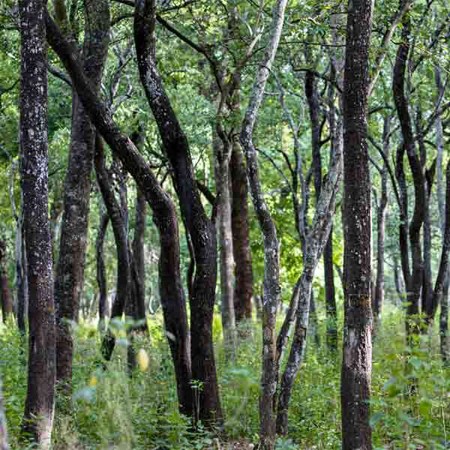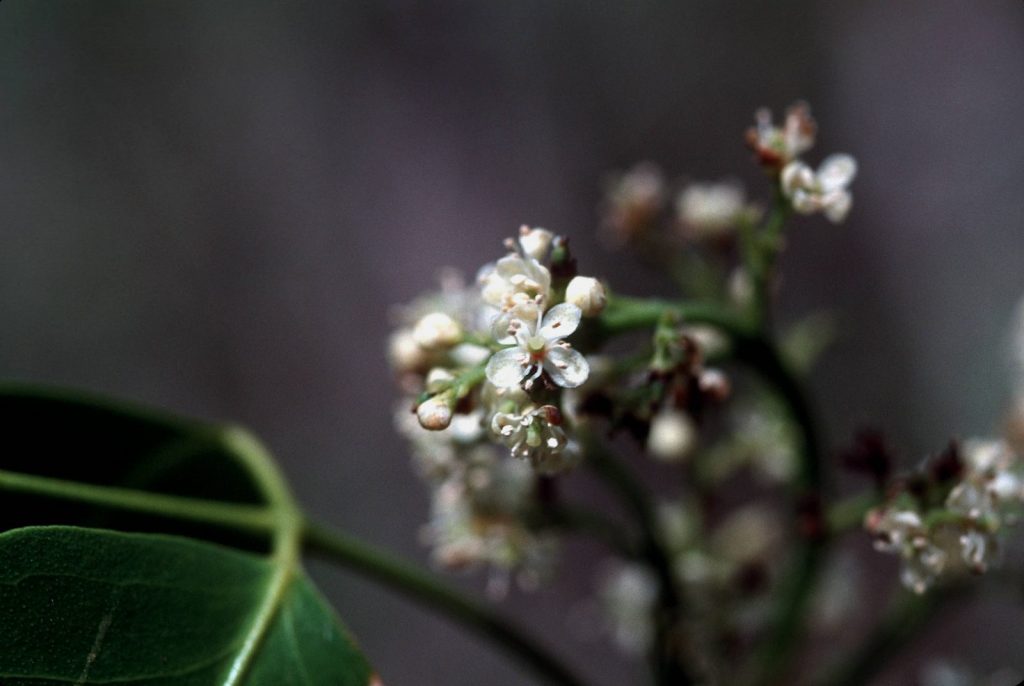I am AMYRIS and my story is RESILIENCE. I am the torch held aloft to light the dark seas and the pre-dawn path through the forest. I am the candle in the window and the candle on the altar. I am the bonfire at the center of the sacred circle. I invite you to warm your hands and your courage at my edges. Even in the shadowy expanse of midnight, I protect you.
If this is a time of death or loss, of grief, shame, fear, serious illness, radical change, disillusionment, or disappointment, I am beside you. I remind you that your divine fire burns on—that you will overcome these hard moments and live again in the sun.
Stop and be still. Do not press forward into the veiled future if your spirit is weary. Breathe gently on the flame of your inner truth and give yourself time to rekindle your passion for life. Your bright, beating heart is still present—under the ashes of what once was—waiting for the right time to burst again into flame.
About Amyris
Amyris (Amyris balsamifera) is a small bushy tree with glossy, compound leaves and white flowers (see opening image for a detail of amyris flowers) that produce bluish fruits. The genus name, Amyris, is from the Greek word, amyron, meaning intensely scented, referring to the strong aroma of the resin from this group of related trees. The leaves, when crushed in the hand, smell lemony.

Native to Haiti, where it grows wild, Amyris is cultivated in tropical zones all over the world including Cuba, Jamaica, Florida, the Cayman Islands, and parts of South America for its resin used in incense and for its essential oil. Indigenous farmers gather branches and trunks and transport them to distilleries mainly in Les Cayes and Port-au-Prince. The wood is aged, then chipped and distilled.
This tree is related to several other species in the Amyris genus including Amyris diatrypa (hairy torchwood), Amyris elemifera (sea torchwood), Amyris madrensis (mountain torchwood), and Amyris texana (Texas torchwood). All of these species exude oleoresin from their trunks. This resin is sometimes called elemi but should not be confused with the resin used to produce the essential oil of elemi from (Canarium luzonicum), a tree native to the Philippines.
Amyris is commonly called torchwood, candlewood, and white torch because the wood is dense in essential oils and highly flammable. Other common names are West Indian sandalwood and West Indian rosewood, arising from the similarity of aroma profiles between the essential oils of these trees. However, amyris is not botanically related to sandalwood (Santalum album) or rosewood (Aniba rosaeodora).
Cultural History Highlights
Before electricity, fishermen, in the nightly quest for crabs and crayfish, lit thick branches of amyris as torches and strapped them to their sea vessels. Amyris torches also guided farmers through inland trade routes before dawn, while bringing their produce to coastal markets. Obviously, this is how amyris received its common names “torchwood” and “white torch.” Aside from its use as touches, amyris was a favorite wood for the hearth fire because it was easy to light even when green or wet. Small branches were used as candles, and dead wood was gathered for hot-burning bonfires.
Natives of the West Indies valued amyris medicinally to reduce fever and prevent shortness of breath. While the wood has a fiery nature, the leaves have a cooling citrus nature. The leaves are soaked in water and added to a bath to reduce fevers or heat in the body. In Cuba, wood chips are soaked in wine and left in the sun for nine days. The resulting elicitor prevents shortness of breath or helps one to catch their breath after a shock. There are some reports that amyris is used in Voodoo for past-life regression ceremonies; however, this is incense resin from the closely related Amyris elemifera.

Amyris Essential Oil
Amyris produces an essential oil through steam distillation of the seasoned (aged) wood and branches. Wood that has been cutand dried for up to six months produces an essential oil with an aroma richer than fresh wood. The essential oil is pale yellow, slightly viscous, and described as slightly musty, slightly musky, sweet, woody, dry, or balsamic with undertones of smoke or light citrus. Some batches have hints of vanilla.
The aroma of amyris is soft in blends and disappears against powerful aromas like German chamomile or peppermint. I like it with citrus aromas, other woods like cedar or sandalwood, and with fresh flowering herbs like lavender or clary sage. In perfumery, it is used as a bridging aroma (something that ties other aromas together) and a fixative (something that helps an aroma last).
Amyris essential oil contains fifty-six known chemical compounds. Twenty percent of these are sesquiterpenes and seventy percent are alcohols with esters, aliphatic aldehydes, coumarins, and unknown trace components making up the rest. The elemol content in the essential oil (around 10%) serves as an effective natural mosquito repellent.
Amyris essential oil exhibits anti-inflammatory, analgesic, and neurosedative effects, making it useful in blends for the muscular system and nervous system. Some aromatherapists note amyris as an antidepressant and useful for anxiety, agitated emotional states, insomnia, mental stress, and emotional trauma.
At the time of this writing, there is no formal research available that suggests that amyris is a notable antidepressant. However, empirical evidence confirms this use. I have used it successfully for myself during times of high stress and added it to blends for others with good results. I find amyris affirms self-soothing, counters negative thought patterns, promotes meditative states, and clears the mind of obsessive thoughts.
Note that amyris essential oil may cause skin sensitivity in some individuals. Dilute the essential oil for external applications, and do not use it on children.
If you have enjoyed this blog post, check out “The Nobel Quest for Amyris”. This folio offers a full, complete, rich, and lustrous story of amyris, the essential oil it produces, the self-directed life-coaching activities it inspires, and the light that shines through all of us. This folio is on sale for $3.99 during the month of February 2019 (usually $8.99).

